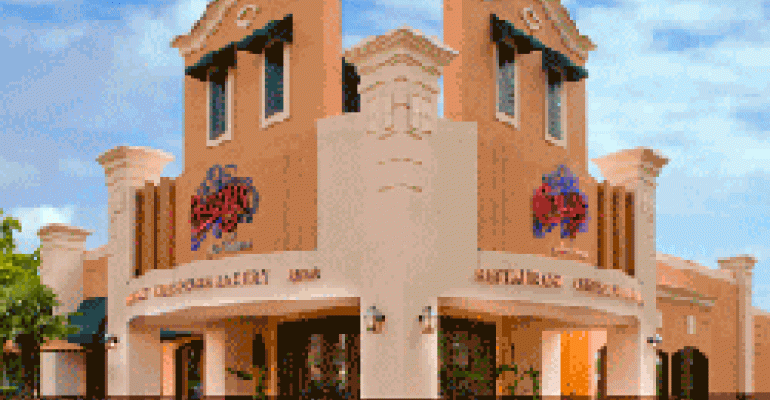BATON ROUGE La. Copeland’s of New Orleans is rolling out a new prototype intended to reduce construction costs and give franchisees greater flexibility in site selection, the company said Thursday.
The first such unit was unveiled here in March, the result of a $1 million renovation. The unit, which is company owned, features a new bakery area, an upgraded kitchen, a renovated “pub-style” bar area and an expanded dining room that can seat 220 customers, company officials said.
(Click here to a view a slideshow of the renovated Baton Rouge, La., Copeland's.)
In addition, the company has added 21 items to the menu at its seven company-owned stores, including more reasonably priced small plates. The revamped menu will roll out to the 13 franchised units in the coming months, officials said.
The size of the new prototype can range from 6,100 to 6,500 square feet, compared to 8,500 to 9000 square feet for a traditional unit, said Andy Gunkler, chief franchise development officer for Al Copeland Investments, which owns the 20-unit chain.
Existing franchisees are required to remodel and update their restaurants every five to seven years, so an older, larger Baton Rouge location was chosen to serve as an example, said Fred Thimm, president of ACI.
“In the Baton Rouge marketplace everybody is obviously experiencing the pangs of the economic situation, but since Katrina, the Baton Rouge marketplace has been a net growth Metropolitan Statistical Area for the state of Louisiana,” Thimm said. “So what we were seeing was a restaurant that was old and not one of our better-maintained facilities, but it was maintaining positive growth sales. So it made sense…it was important to get a new look and feel out there and show franchisees it can be done in a cost effective manner.”
The cost of implementing the new prototype is about $200 a foot, excluding equipment, depending on the location, Gunkler said. The company also works with outside vendors to help reduce equipment costs for franchisees, he said.
“We’re always trying to find value and look at the cost of investment for a franchisee,” he said.
He added, “They can choose the Cadillac of equipments or the Chevy model. I give choices to franchises and let them make the choice of what types of equipment they’ll want to have and still meet specifications.”
The company depended on both internal and external input to make sure that the new design elements would work efficiently, Thimm said. He added that the process was “evolutionary,” since several units already incorporate some of the prototype’s aspects.
Klover Architects, a design firm based in Overland Park, Kan., worked with Copeland’s in-house design group. The group designed the prototype from the kitchen out to find ways to do more in a smaller space.
Taking into account Copeland’s curbside business, the pick-up area was also moved closer to the kitchen, allowing food to go straight from the kitchen to the customer outside
The new prototype isn’t just about efficiencies, officials said. With elements such as wrought iron, gas lanterns and fireplaces, the look and feel of New Orleans is conveyed in a cozy and upscale aesthetic that is meant to work in tandem with the concept’s cuisine, which features over 60 items that are made from scratch.
The restaurant also features a remodeled outdoor seating area with a water wall made from brick that streams water to recreate an authentic New Orleans feel of dining al fresco in a courtyard. “The goal is to transport the spirit of New Orleans outside of New Orleans,” Thimm said.
“When you’re driving down the street we stand out. We spell out that ‘New Orleans’ feel to you, not just another casual-dining concept,” said Gunkler.
Thimm added, “It’s all about differentiation today. If you’re not bringing something unique that isn’t comparable, not just in architecture, but also in food and service, we’re kind of like ‘Why bother?’”
Nearly half of the seven company-owned units now fit the new prototype, and the remaining company-owned restaurants will be renovated in the next couple of years, Gunkler said.
In the meantime, franchise deals are under discussion in Kentucky, Indiana, Illinois, Colorado, Tennessee, Arkansas and Florida, Gunkler said.
Al Copeland Investments, which is based in Metairie, La., was founded by Popeyes Famous Fried Chicken & Biscuits founder Al Copeland, and owns and operates other food, restaurant and entertainment enterprises, such as Copeland’s Cheesecake Bistro, Copeland’s Social City and others.
Contact Sonya Moore at [email protected]





